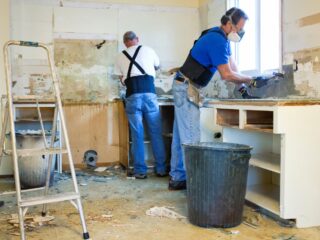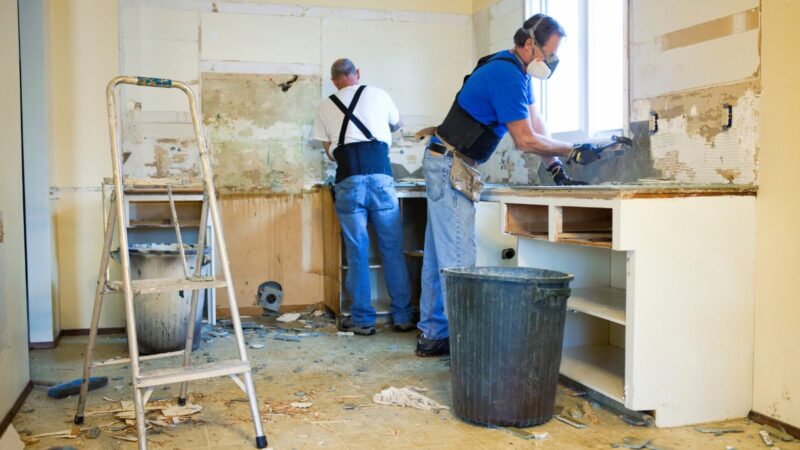
When it comes to keeping our homes and workplaces clean, most of us are familiar with the concept of regular cleaning. However, when it comes to certain types of messes, regular cleaning methods simply aren’t enough. This is where biohazard cleaning comes in. But what exactly is biohazard cleaning, and how does it differ from regular cleaning?
First, let’s define biohazards. The Centers for Disease Control and Prevention (CDC) define biohazards as “substances of biological origin that pose a threat to the health of humans and other living organisms.”. One of the most common biohazards is blood, and it requires special attention while cleaning. Blood can carry a variety of pathogens that can cause serious infections, such as hepatitis B and C and HIV. Blood can also contain other harmful substances, such as heavy metals and chemicals. This is why it’s essential to communicate with experts who know how to clean up blood.
Examples of Biohazards Include:
- Blood and bodily fluids such as saliva, urine, and feces
- Pathogens such as bacteria, viruses, and fungi
- Toxins and chemicals that are produced by certain types of bacteria
- Medical waste such as sharps (needles and syringes) and infectious materials
- Animal waste and carcasses
- Waste products from industrial and agricultural operations
- Radioactive materials
- Mold and mildew
- Sewage and greywater
- Pesticides and hazardous waste.
What Does a Professional Biohazard Cleaning Company Do?
- Clean and Disinfect Affected Areas: Biohazard cleaners are specially trained professionals who are equipped to handle and clean up potentially dangerous materials, such as blood and bodily fluids, pathogens, and other harmful substances that can cause harm to living organisms. They are responsible for cleaning and disinfecting areas that have been contaminated with biohazards, which can be found in a variety of settings, including homes, businesses, and public spaces. These areas may be contaminated as a result of accidents, crime scenes, or other incidents.
- Remove and Dispose of Biohazardous Materials: Biohazard cleaners are equipped to safely remove and dispose of a variety of biohazardous materials that may pose a risk to human health. This includes sharps, which are items such as needles and syringes that can puncture the skin and transmit diseases. It also includes medical waste, which can include materials such as dressings, bandages, and other items that have come into contact with bodily fluids or pathogens. Additionally, they can handle and dispose of animal waste, which can contain harmful pathogens and parasites that can cause illness in humans.
- Test for and Remove Harmful Pathogens: To test for and remove pathogens, biohazard cleaners use specialized equipment and techniques. This includes using swabs or other sampling methods to collect samples from surfaces and then testing the samples in a lab to identify the presence of specific pathogens. Once the pathogens have been identified, biohazard cleaners use specialized cleaning solutions and equipment to effectively remove them from the affected areas. This can include the use of chemical disinfectants, UV-C light, and other technologies that are effective in killing a wide range of pathogens.
- Provide Odor Removal Services: They can also remove any odors caused by biohazards, such as the smell of decomposition.
- Provide Trauma Scene Cleanup: They can clean and disinfect areas after a traumatic event, such as a suicide or homicide.
- Provide Crime Scene Cleanup: They can clean and disinfect areas after a crime has occurred, such as a robbery or assault.
- Provide Hoarding Cleanup: They can clean and disinfect areas affected by hoarding, which often involves biohazards such as animal waste and mold.
- Provide Decontamination Services: Biohazard cleaners are also trained to decontaminate areas that have been exposed to harmful chemicals or radioactive materials. This type of decontamination is known as hazardous material (hazmat) decontamination. These materials can pose a significant risk to human health and the environment if not handled properly.
- Provide Disinfection and Sanitization Services: They can apply disinfectants and sanitizers to kill and prevent the spread of bacteria and viruses.
- Provide Consulting Services: They can provide consulting services to help businesses, organizations, and individuals understand and manage the risks associated with biohazards. These services can include assessments of risk, recommendations for procedures and protocols, training for employees, and information and guidance on how to protect themselves from exposure to biohazards.
Some of the Key Factors to Look for in a Biohazard Cleaning Company Include the Following:
Certification and Licensing: Make sure that the company is properly licensed and certified to perform biohazard cleaning services. This will ensure that the company is following the proper regulations and procedures to ensure the safety of both the cleaning staff and the individuals being served.
Experience and Expertise: Look for a company with a proven track record of experience and expertise in biohazard cleaning services. The company should have a team of highly trained and experienced cleaners who have the necessary knowledge and equipment to work safely and effectively handle biohazards.
Insurance Coverage: Choose a company that has adequate insurance coverage to protect you in the event of any accidents or incidents. This will ensure that you are not held liable for any damages or injuries that may occur during the cleaning process.
Reputation: Seek out a company that has a positive image in the field. Check for customer reviews and testimonials to get an idea of the company’s level of quality and customer service.
Availability: Make sure that the company is available to perform the cleaning services when you need them. Consider the company’s response time, hours of operation, and availability of emergency services.
Pricing: Consider the cost of the services offered by the company. While it is important to choose a company that provides high-quality services, it is also important to ensure that the services are reasonably priced and within your budget.
Final thoughts
In conclusion, while regular cleaning is important for keeping our homes and workplaces clean, it’s not enough when it comes to certain types of messes. Biohazard cleaning is a specialized field that requires a higher level of attention to detail, specialized equipment, and specialized training. Therefore, it’s essential to use a professional biohazard cleaning company when dealing with a biohazardous situation to ensure that the area is properly cleaned and disinfected and that all biohazardous materials are disposed of safely.













